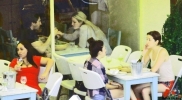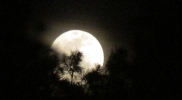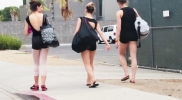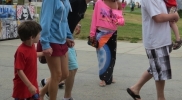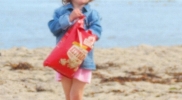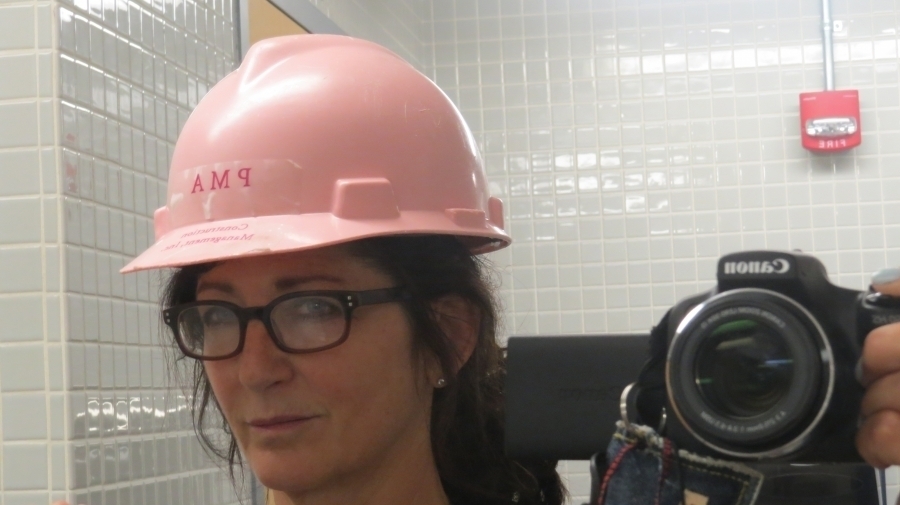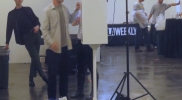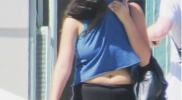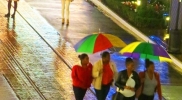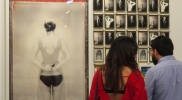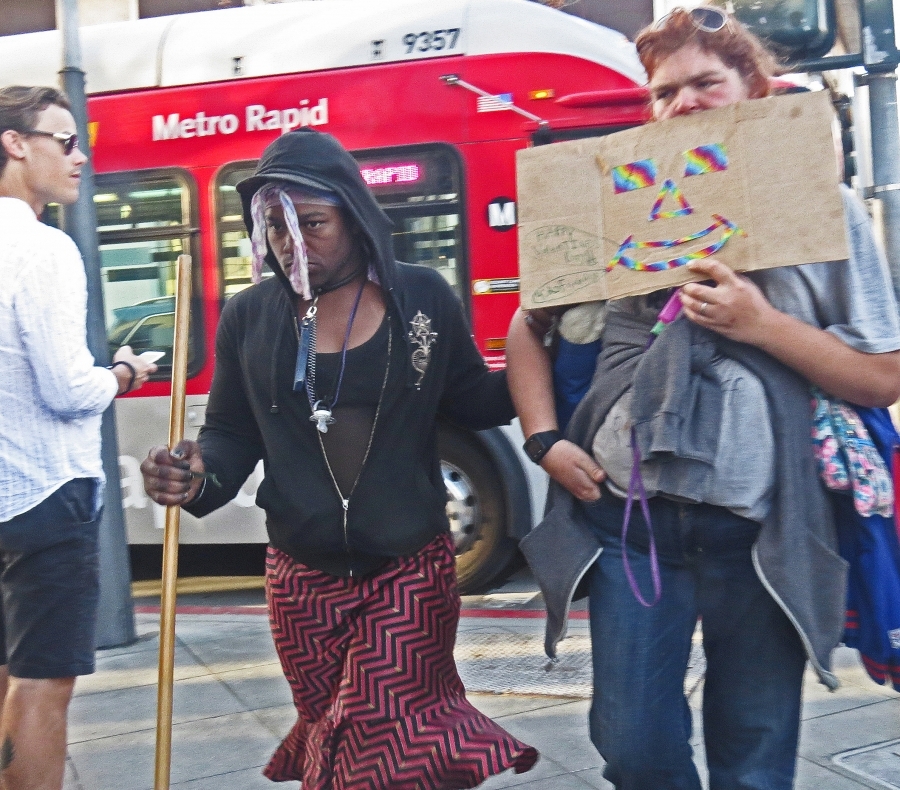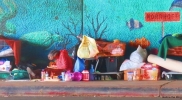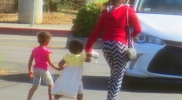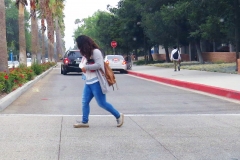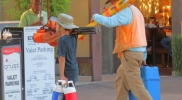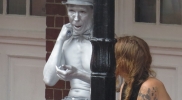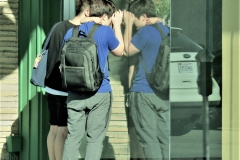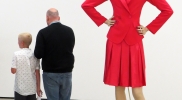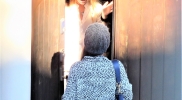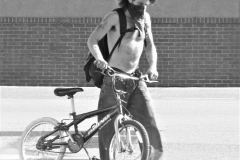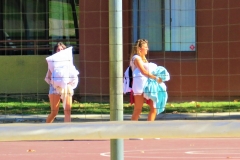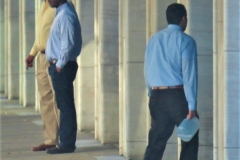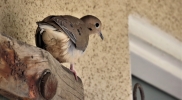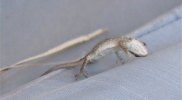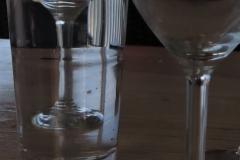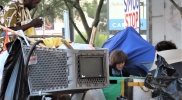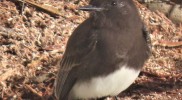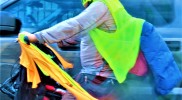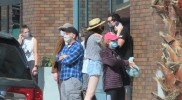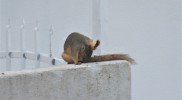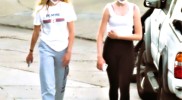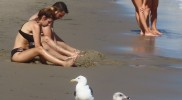|
|
Best Poems - Rhythms of Life
Best Poems – RHYTHMS OF LIFE
|
| |
Nuit Blanche: North End – Conrad Aiken
“RED and green neon lights, the jazz hysteria,
for all-night movie and all-night cafeteria;
you feed all night in one, and sleep in the other,
and dream that a strip-tease queen was your sweetheart’s
mother
A nickel or a coffee-half, a dime or a seat;
the blondes and the guns are streamlined and complete;
streamlined, dreamlined, with wide open cactus spaces
between the four-foot teeth in the ten-foot faces.
Hot trumpets and hot trombones for a soft-sole shuffle!
Sailors, bring in your tattoos, park your duffel!
There’s a green-tailed blue-eyed mermaid stinging my
shoulder,
and I’ve got to pass out before I’m a minute older. . . .” |
| |
|
The Time Has Come, The Clock Says The Time Has Come – Conrad Aiken
“The time has come, the clock says time has come.
Here in the mid-waste of my life I pause,
The hour is in my hand, and in my heart
Miscellany of shards and shreds. The clock
Ticks its iambics, and the heart its spondees
Time has come, time has come and gone,
Winter has taken its toll, summer its harvest,
Spring has brought and taken away its illusion.
What is time, the clock says what is time,
Never the past, never the future, always the now,
What is time, the seed says it is all
Fertility turned deep by the foot of the plowl. . . .” |
| |
My Philosophy Of Life - John Ashbery
"Just when I thought there wasn’t room enough
for another thought in my head, I had this great idea—
call it a philosophy of life, if you will. Briefly,
it involved living the way philosophers live,
according to a set of principles. OK, but which ones?
That was the hardest part, I admit, but I had a
kind of dark foreknowledge of what it would be like.
Everything, from eating watermelon or going to the bathroom
or just standing on a subway platform, lost in thought
for a few minutes, or worrying about rain forests,
would be affected, or more precisely, inflected
by my new attitude. I wouldn’t be preachy,
or worry about children and old people, except
in the general way prescribed by our clockwork universe.
Instead I’d sort of let things be what they are
while injecting them with the serum of the new moral climate
I thought I’d stumbled into, as a stranger
accidentally presses against a panel and a bookcase slides back,
revealing a winding staircase with greenish light
somewhere down below, and he automatically steps inside
and the bookcase slides shut, as is customary on such occasions.
At once a fragrance overwhelms him—not saffron, not lavender,
but something in between. He thinks of cushions, like the one
his uncle’s Boston bull terrier used to lie on watching him
quizzically, pointed ear-tips folded over. And then the great rush
is on. Not a single idea emerges from it. It’s enough
to disgust you with thought. But then you remember something
William James
wrote in some book of his you never read—it was fine, it had the
fineness,
the powder of life dusted over it, by chance, of course, yet
still looking
for evidence of fingerprints. Someone had handled it
even before he formulated it, though the thought was his and
his alone.
It’s fine, in summer, to visit the seashore.
There are lots of little trips to be made.
A grove of fledgling aspens welcomes the traveler. Nearby
are the public toilets where weary pilgrims have carved
their names and addresses, and perhaps messages as well,
messages to the world, as they sat
and thought about what they’d do after using the toilet
and washing their hands at the sink, prior to stepping out
into the open again. Had they been coaxed in by principles,
and were their words philosophy, of however crude a sort?
I confess I can move no farther along this train of thought—
something’s blocking it. Something I’m
not big enough to see over. Or maybe I’m frankly scared.
What was the matter with how I acted before?
But maybe I can come up with a compromise—I’ll let
things be what they are, sort of. In the autumn I’ll put up jellies
and preserves, against the winter cold and futility,
and that will be a human thing, and intelligent as well.
I won’t be embarrassed by my friends’ dumb remarks,
or even my own, though admittedly that’s the hardest part,
as when you are in a crowded theater and something you say
riles the spectator in front of you, who doesn’t even like the idea
of two people near him talking together. Well he’s
got to be flushed out so the hunters can have a crack at him—
this thing works both ways, you know. You can’t always
be worrying about others and keeping track of yourself
at the same time. That would be abusive, and about as much fun
as attending the wedding of two people you don’t know.
Still, there’s a lot of fun to be had in the gaps between ideas.
That’s what they’re made for! Now I want you to go out there
and enjoy yourself, and yes, enjoy your philosophy of life, too.
They don’t come along every day. Look out! There’s a big one..."
|
| |
My/My/My – Charles Bernstein
“Count these number of things you call mine. This is the distance between
you and enlightenment.”
—Swami Satchidananda.
(for Jenny)
“my pillow
my shirt
my house
my supper
my tooth
my money
my kite
my job
my bagel
my spatula
my blanket
my arm
my painting
my fountain pen
my desk
my room
my turn
my book
my hopelessness
my wallet
my print
my sock
my toe
my stamp
my introduction
my luggage
my plan
my mistake
my monkey
my friend
my penis
my anger
my expectation
my pencil
my pain
my poster
my fear
my luggage tag
my eyes
my raiment
my wash
my opinion
my fat
my sleeplessness
my love
my basket
my lunch
my game
my box
my drawer
my cup
my longing
my blotter
my distraction
my underpants
my papers
my wish
my despair
my erasure
my plantation
my candy
my thoughtfulness
my forbearance
my gracelessness
my courage
my crying
my hat
my pocket
my dirt
my body
my sex
my scarf
my solidarity
my hope
my spelling
my smile
my gaze
my helplessness
my quilt
my reply
my enemy
my records
my letter
my gait
my struggle
my spirit
my cut
my thorn
my demise
my dream
my plate
my pit
my hollow
my blindness
my clinging
my projection
my teacher
my homework
my housework
my responsibility
my guilt
my relaxation
my boat
my crew
my peanut butter
my mill
my man
my hopelessness
my fooling
my sweet
my terror
my programme
my judgement
my disguise
my distress
my ladle
my soup
my mother
my basin
my pleat
my cheddar
my ownership
my enmity
my thought
my encyclopedia
my property
my formula
my infidelity
my discretion
my decision
my delusion
my deduction
my derision
my destitution
my delinquency
my belt
my erotica
my junk
my jealousy
my remorse
my strength
my vision
my world
my fantasy
my anger
my determination
my refusal
my commitment
my insanity
my verbosity
my austerity
my androgyny
my defiance
my insistence
my mastication
my arousal
my mystification
my obscuration
my ejaculation
my prostration
my wantonness
my cigarette
my belief
my uncertainty
my cat
my penetration
my insight
my obsolescence
my sleeping bag
my temptation
my dedication
my ball
my court
my kidney
my razor
my way
my tissue
my inadequacy
my own
my recorder
my song
my knack
my perception
my will
my canoe
my billiard ball
my content
my cassette
my voice
my sight
my knowledge
my bowels
my beard
my child
my lethargy
my nerve
my incredulity
my banana
my ink
my refrigerator
my car
my change
my pupil
my hair
my tongue
my tenderness
my star
my skill
my persona
my popularity
my pickle
my pinto
my window
my remembrance
my munificence
my country
my fragility
my visit
my longevity
my curtness
my incomparability
my sarcasm
my sincerity
my bed
my bed table
my table top
my bar mitzvah
my laughter
my scorn
my heartache
my sandwich
my call
my loss
my wit
my charm
my jest
my undoing
my practice
my piano lesson
my rage
my toe
my tattoo
my turtledove
my fly swatter
my vest
my notebook
my pocketbook
my sketchbook
my repulsion
my tea cup
my taste
my bag
my handbag
my bike
my jay
my roll
my dear
my milk
my closet
my slacks
my hoist
my ennui
my analysis
my language
my fortune
my vagueness
my mint
my limit
my import
my inference
my affectation
my affection
my insolence
my solitude
my memory
my bottle
my history
my ability
my adobe
my mission
my likeness
my misery
my solipsism
my omission
my regression
my opera
my penicillin
my resentment
my future
my understanding
my apricots
my holiday
my umbrella
my favorite
my mood
my side
my seat
my figment
my contour
my sky
my rainbow
my god
my mask
my reflection
my blessing
my light
my time
my epoxy
my drum
my hammer
my grease
my sand
my story
my top
my past
my mark
my depth
my garden
my silence
my speech
my selfishness
my hunger
my allowance
my letter
my massage
my derision
my epoch
my space
my land
my plenitude
my perversity
my poverty
my transgression
my exultation
my lack
my lustre
my beatitude
my remission
my incantation
my white
my pulse
my creation
my grace
my object
my sum
my contumely
my gloom
my idea
my chart
my circumference
my gravity
my polarity
my distance
my eyelid
my planting
my separation
my id
my art
my death
my stand
my preparation
my heart
my life
my impression
my grave
my graciousness
my marrow
my heaven
my appearance
my olive oil
my flake
my self
my porridge
my mind
my function
my nakedness
my illumination
my freedom
my charity
my rose
my pallour
my pomp
my pajamas
my pity
my posing
my prayer
my dawn
my ocean
my tide
my underarm
my spectacle
my drifting
my ground
my body
my angels
my worship
my dew
my hobby horse
my customer
my bread
my faith
my lies
my care
my restlessness
my sunflower
my weariness
my age
my existence
my sense
my backache
my pie
my thanks
my numbness
my sweeping
my inspiration
my token
my pond
my brillo
my squint
my pound
my rock
my critique
my aplomb
my portrait
my view
my rocking chair
my sisters
my demands
my gumdrops
my word”
|
| |
|
Song of Welcome – Joseph Brodsky
“Here’s your mom, here’s your dad.
Welcome to being their flesh and blood.
Why do you look so sad?
Here’s your food, here’s your drink.
Also some thoughts, if you care to think.
Welcome to everything.
Here’s your practically clean slate.
Welcome to it, though it’s kind of late.
Welcome at any rate.
____
Here’s your paycheck, here’s your rent.
Money is nature’s fifth element.
Welcome to every cent.
Here’s your swarm and your huge beehive.
Welcome to the place with its roughly five
billion like you alive.
Welcome to the phone book that stars your name.
Digits are democracy’s secret aim.
Welcome to your claim to fame.
____
Here’s your marriage, and here’s divorce.
Now that’s the order you can’t reverse.
Welcome to it; up yours,
Here’s your blade, here’s your wrist.
Welcome to playing your own terrorist;
call it your Middle East.
Here’s your mirror, your dental gleam.
Here’s an octopus in your dream.
Why do you try to scream?
____
Here’s your corncob, your TV set.
Your candidate suffering an upset.
Welcome to what he said.
Here’s your porch, see the cars pass by.
Here’s your shitting dog’s guilty eye.
Welcome to its alibi.
Here are your cicadas, then a chickadee,
the bulb’s dry tear in your lemon tea.
Welcome to infinity.
____
Here are your pills on the plastic tray,
your disappointing, crisp X-ray.
You are welcome to pray.
Here’s your cemetery, a well-kept glen.
Welcome to a voice that says “Amen.”
The end of the rope, old man.
Here’s your will, and here’s a few
takers. Here’s an empty pew.
Here’s life after you.”
|
| |
| Pippa Passes (song) – Robert Browning
“The year’s at the spring,
And day’s at the morn;
Morning’s at seven;
The hill-side’s dew-pearled:
The lark’s on the wing
The snail’s on the thorn;
God’s in his heaven—
All’s right with the world!” |
| |
| Of Colours And Shadows – Ahmed Tidjani-Cissé
“Royal blue azure blue
The nobility of a colour
to clothe the uncertainty of conditions.
Green-blue turquoise blue
The adornments of nature
scorn the audacities of imitation
they ornament the fleeting hair of the tornado.
Ash grey, dirty grey, iron grey, pearl grey
The metamorphosing power of a colour
which shatters the yokes of comparison.
Sulpher yellow, saffron yellow, golden yellow
Fever can be yellow
Yellow is a self-respecting colour
The yellow of the egg was the beginning
But the respect for a colour is only apparent
when the yellow peril is in question.
Vermilion red, blood red, poppy red
Cardinals’ purple is a red
which sends howling the Gehenna of fear.
The purple of Caesars is all-conquering
Cortez and Pizarro have flaunted the colours of Europe
to the redskins in organizing a hecatomb.
Marxism-Leninism is red
There are colours of poverty
fetishist colours
opulent colours
colours which strike terror or which the whole world unfurls.
Milk white kapok white
The moon is white
Innocence is white
the blindman’s stick is white
the Ku-Klux-Klan is robed in white
my village was evangelized by the White Fathers.
Their words were transmitted with the aid of white cold steel.
To fashion the centuries of history
men have invented all the nuances of a colour
Black bread, black night, black misery
Mourning is black, the devil is black
with black ebony one can construct
a black market to supply the fields
with cotton of the whitest fibre.
The colours which compose my rainbow
Have the density of shadows.
At the borders of my rainbow
history has allowed only a clear obscurity to float.
Like a raging cataract
the dusky shadows of my colour
make a rampart around my house
every time I try to break
the barriers of colour.
Red, blue, yellow, white, black.
The shadows of colours are not truly multicoloured.
Red as palm oil
The snow hides in its own whiteness
behind my door
it will not see me
I have ceased to be the shadow of my colour.” |
| |
| The Thirty-Eighth Year – Lucille Clifton
“the thirty eighth year
of my life,
plain as bread
round as a cake
an ordinary woman.an ordinary woman.
i had expected to be
smaller than this,
more beautiful,
wiser in Afrikan ways,
more confident,
i had expected
more than this.
i will be forty soon.
my mother once was forty.
my mother died at forty four,
a woman of sad countenance
leaving behind a girl
awkward as a stork.
my mother was thick,
her hair was a jungle and
she was very wise
and beautiful
and sad.
i have dreamed dreams
for you mama
more than once.
i have wrapped me
in your skin
and made you live again
more than once.
I have taken the bones you hardened
and built daughters
and they blossom and promise fruit
like Afrikan trees.
i am a woman now,
an ordinary woman.
in the thirty-eighth
year of my life,
surrounded by life,
a perfect picture of
blackness blessed,
i had not expected this
loneliness.
if it is western,
if it is the final
Europe in my mind,
if in the middle of my life
I am turning the final turn
into the shining dark
let me come to it whole
and holy
not afraid
not lonely
out of my mother’s life
into my own.
into my own.
i had expected more than this.
i had not expected to be
an ordinary woman” |
| |
| After the Funeral – Billy Collins
“When you told me you needed a drink-drink
and not just a drink like a drink of water,
I steered you by the elbow into a corner bar,
which turned out to be a real bar-bar,
dim and nearly empty with little tables in the back
where we drank and agreed that the funeral
was a real funeral-funeral complete with a Mass,
incense, and tons of eulogies.
You know, I always considered Tom a real
friend-friend, you said, lifting your drink-drink
to your lips, and I agreed that Tom
was much more than just an ordinary friend.
We also concurred that Angela’s black dress
was elegant but not like elegant-elegant,
just elegant enough. And a few hours later
when the bartender brought yet another round
of whiskeys to our table in the corner
we recognized by his apron and his mighty girth
that he was more than just a bartender.
A true bartender-bartender was what he was
we decided, with a respectful clink-clink
of our drink-drinks, amber in a chink of afternoon light.” |
| |
| A Portrait of the Reader with a Bowl of Cereal – Billy Collins
“A poet. . . never speaks directly,
as to someone at the breakfast table.” – Yeats
“Every morning I sit across from you
at the same small table,
the sun all over the breakfast things—
curve of a blue-and-white pitcher,
a dish of berries—
me in a sweatshirt or robe,
you invisible.
Most days, we are suspended
over a deep pool of silence.
I stare straight through you
or look out the window at the garden,
the powerful sky,
a cloud passing behind a tree.
There is no need to pass the toast,
the pot of jam,
or pour you a cup of tea,
and I can hide behind the paper,
rotate in its drum of calamitous news.
But some days I may notice
a little door swinging open
in the morning air,
and maybe the tea leaves
of some dream will be stuck
to the china slope of the hour—
then I will lean forward,
elbows on the table,
with something to tell you,
and you will look up, as always,
your spoon dripping milk, ready to listen.” |
| |
| The Story We Know – Martha Collins
“The way to begin is always the same. Hello,
Hello. Your hand, your name. So glad, Just fine,
And Good-bye at the end.
That’s every story we know,
And why pretend? But lunch tomorrow? No?
Yes? An omelette, salad, chilled white wine?
The way to begin is simple, sane, Hello,
And then it’s Sunday, coffee, the Times, a slow
day by the fire, dinner at eight or nine
and Good-bye. In the end, this is a story we know
so well we don’t turn the page, or look below
the picture, or follow the words to the next line:
The way to begin is always the same Hello.
But one night, through the latticed window, snow
begins to whiten the air, and the tall white pine.
Good-bye is the end of every story we know
that night, and when we close the curtains, oh,
We hold each other against that cold white sign
Of the way we all begin and end. Hello,
Good-bye is the only story. We know, we know.” |
| |
| Writ on the Eve of my 32nd Birthday – Gregory Corso
“I am 32 years old
and finally I look my age, if not more.
Is it a good face what’s no more a boy’s face?
It seems fatter. And my hair,
it’s stopped being curly. Is my nose big?
The lips are the same.
And the eyes, ah the eyes get better all the time.
32 and no wife, no baby; no baby hurts,
but there’s lots of time.
I don’t act silly any more.
And because of it I have to hear from so-called friends:
‘You’ve changed. You used to be so crazy so great.’
They are not comfortable with me when I’m serious.
Let them go to the Radio City Music Hall.
32; saw all of Europe, met millions of people;
was great for some, terrible for others.
I remember my 31st year when I cried:
‘To think I may have to go another 31 years!’
I don’t feel that way this birthday.
I feel I want to be wise with white hair in a tall library
in a deep chair by a fireplace.
Another year in which I stole nothing.
8 years now and haven’t stole a thing!
I stopped stealing!
But I still lie at times,
and still am shameless yet ashamed when it comes
to asking for money.
32 years old and four hard real funny sad bad
wonderful books of poetry
—the world owes me a million dollars.
I think I had a pretty weird 32 years.
And it weren’t up to me, none of it.
No choice of two roads; if there were,
I don’t doubt I’d have chosen both.
I like to think chance had it I play the bell.
The clue, perhaps, is in my unabashed declaration:
‘I’m good example there’s such a thing as called soul.’
I love poetry because it makes me love
and presents me life.
And of all the fires that die in me,
there’s one burns like the sun;
it might not make day my personal life,
my association with people,
or my behavior toward society,
but it does tell me my soul has a shadow.” |
| |
|
Four Men in a Car – Philip Dacey
“The ugliest thing in the world is the sight of four men in a car.”
—David Bailey, photographer
“We sit in the womanless car,
maleness twice-squared, going nowhere.
Two in front and two in back,
in the Jill-less car, Jack, Jack, Jack, and Jack.
We know how ugly we are,
but what can we do? We live here.
The truth is none of us can drive,
though our horsepower is impressive.
It may be a meeting’s our goal,
or a game, or something illegal,
but it’s all the same. The deadest end.
So we tell jokes. You know the kind.
Outside the car the women walk
and run and leap or make such talk
as prompts their hands to fly about
in ways ours, cramped inside, cannot.
Close, but not too, we don’t move much;
it’s accidental when we touch.
Oh, there’s nothing as ugly as we,
four men in a car, not five or three.
To breathe, we roll our windows down,
and then we roll them up again.”
|
|
[softly, drowsily] – Walter de la Mare
“Softly, drowsily,
Out of sleep;
Into the world again
Ann’s eyes peep;
Over the pictures
Across the walls
One little quivering
Sunbeam falls.
A thrush in the garden
Seems to say,
Wake, Little Ann,
‘Tis day, ’tis day;
Faint sweet breezes
The casement stir
Breathing of pinks
And lavender,
At last from her pillow,
With cheeks bright red,
Up comes her round little
Tousled head;
And out she tumbles
From her warm bed.” |
| |
|
Tell all the Truth but tell it slant – Emily Dickinson
“Tell all the Truth but tell it slant—
Success in Circuit lies
Too bright for our infirm Delight
The Truth’s superb surprise
As Lighting to the Children eased
With explanation kind
The truth must dazzle gradually
Or every man be blind—
|
|
Advice To Myself – Louise Erdrich
“Leave the dishes.
Let the celery rot in the bottom drawer of the refrigerator
and an earthen scum harden on the kitchen floor.
Leave the black crumbs in the bottom of the toaster.
Throw the cracked bowl out and don’t patch the cup.
Don’t patch anything. Don’t mend. Buy safety pins.
Don’t even sew on a button.
Let the wind have its way, then the earth
that invades as dust and then the dead
foaming up in gray rolls underneath the couch.
Talk to them. Tell them they are welcome.
Don’t keep all the pieces of the puzzles
or the doll’s tiny shoes in pairs, don’t worry
who uses whose toothbrush or if anything
matches, at all.
Except one word to another. Or a thought.
Pursue the authentic—decide first
what is authentic,
then go after it with all your heart.
Your heart, that place
you don’t even think of cleaning out.
That closet stuffed with savage mementos.
Don’t sort the paper clips from screws from saved baby teeth
or worry if we’re all eating cereal for dinner
again. Don’t answer the telephone, ever,
or weep over anything at all that breaks.
Pink molds will grow within those sealed cartons
in the refrigerator. Accept new forms of life
and talk to the dead
who drift in through the screened windows, who collect
patiently on the tops of food jars and books.
Recycle the mail, don’t read it, don’t read anything
except what destroys
the insulation between yourself and your experience
or what pulls down or what strikes at or what shatters
this ruse you call necessity.”
|
| |
|
Pictures of the Gone World (#8) – Lawrence Ferlinghetti
“It was a face which darkness could kill
in an instant
a face as easily hurt
by laughter or light
‘We think differently at night’
she told me once
lying back languidly
And she would quote Cocteau
‘I feel there is an angel in me’ she’d say
‘whom I am constantly shocking’
Then she would smile and look away
light a cigarette for me
sigh and rise
and stretch
her sweet anatomy
let fall a stocking” |
| |
| Pictures of the Gone World (#11) – Lawrence Ferlinghetti
“The world is a beautiful place
to be born into
if you don’t mind happiness
not always being
so very much fun
if you don’t mind a touch of hell
now and then
just when everything is fine
because even in heaven
they don’t sing
all the timeThe world is a beautiful place
to be born into
if you don’t mind some people dying
all the time
or maybe only starving
some of the time
which isn’t half so bad
if it isn’t you
Oh the world is a beautiful place
to be born into
if you don’t much mind
a few dead minds
in the higher places
or a bomb or two
now and then
in your upturned faces
or such other improprieties
as our Name Brand society
is prey to
with its men of distinction
and its men of extinction
and its priests
and other patrolmen
and its various segregations
and congressional investigations
and other constipations
that our fool flesh
is heir to
Yes the world is the best place of all
for a lot of such things as
making the fun scene
and making the love scene
and making the sad scene
and singing low songs and having inspirations
and walking around
looking at everything
and smelling flowers
and goosing statues
and even thinking
and kissing people and
making babies and wearing pants
and waving hats and
dancing
and going swimming in rivers
on picnics
in the middle of the summer
and just generally
‘living it up’
Yes
but then right in the middle of it
comes the smiling
mortician” |
| |
Acquainted With The Night – Robert Frost
"I have been one acquainted with the night.
I have walked out in rain—and back in rain.
I have outwalked the furthest city light.
I have looked down the saddest city lane.
I have passed by the watchman on his beat
And dropped my eyes, unwilling to explain.
I have stood still and stopped the sound of feet
When far away an interrupted cry
Came over houses from another street,
But not to call me back or say good-bye;
And further still at an unearthly height,
One luminary clock against the sky
Proclaimed the time was neither wrong nor right
I have been one acquainted with the night."
|
| |
| Ode to Drinking Water From My Hands – Ross Gay
“which today, in the garden,
I’d forgotten
I’d known and more
forgotten
I’d learned and was taught this
by my grandfather
who, in the midst of arranging
and watering
the small bouquets
on mostly the freshest graves
saw my thirst
and cranked the rusty red pump
bringing forth
from what sounded like the gravelly throat
of an animal
a frigid torrent
and with his hands made a lagoon
from which he drank
and then I drank
before he cranked again
making of my hands, now,
a fountain in which I can see
the silty bottom
drifting while I drink
and drink and
my grandfather waters the flowers
on the graves
among which are his
and his wife’s
unfinished and patient, glistening
after he rinses the bird shit
from his wife’s
and the pump exhales
and I drink
to the bottom of my fountain
and join him
in his work.” |
| Virgil, Hey – Camille Guthrie
“Ah me! I find myself middle-aged divorced lost
In the forest dark of my failures mortgage & slack breasts
It’s hard to admit nobody wants to do me anymore
Not even Virgil will lead me down to his basement rental
Take a look at my firstborn son
Who put me on three months’ bedrest
For whom I bled on the emergency room floor
Who declaims his device sucks
Stabs holes in his bedroom wall
Complains his ATV’s too slow
Who plots to run away to join terrorists
He’d rather die than do math
And the little one ripped
From my womb in the surgery room
I pierced my nipples to unblock her milk
Who pours lemonade on the floor for skating
Howls in rage cause her cake isn’t pretty
Carved No Mom on her door with scissors
Who says, No fence but you’re kinda fat
She’d rather die than wear underpants
Virgil, hey! Send me down
To the second circle of hell where I belong
With those whom Love separated from Reason
Where an infernal hurricane will blast me
Hither & thither with no hope ever no comfort
Rather than drive these two to school this morning
And suffer forever with the other mothers”
|
| |
Elysian Fields – Marilyn Hacker
[Best American Poetry 1992: from “The Paris Review”]
“‘Champs Elysées of Broadway’ says the awning
of the café where, every Sunday morning,
young lawyers in old jeans ripped at the knees
do crosswords. Polyglot Lebanese
own it: they’ve taken on two more shopfronts
and run their banner down all three at once.
Four years ago, their sign, ‘Au Petit Beurre’
was so discreet, that, meeting someone there,
I’d tell her the street corner, not the name.
They were in the right place at the right time.
Meanwhile, the poor are trying hard enough.
Outside, on Broadway, people sell their stuff
laid out on blankets, cardboard cartons, towels.
A stout matron with lacquered auburn curls
circles the viridian throw rug
and painted plaster San Martín to hug
a thinner, darker woman, who hugs her
back volubly in Spanish—a neighbor,
I guess, and guess they still have houses.
The man with uncut, browned French paperbacks,
the man with two embroidered gypsy blouses
and three pilled pitiful pairs of plaid slacks
folded beside him on the pavement where
there was a Puerto Rican hardware store
that’s been a vacant shopfront for two years
may not. There’s a young couple down the block
from our corner: she’s tall, gaunt, gangly, black;
he’s short, quick, volatile, unshaven, white.
They set up shop dry mornings around eight.
I’ve seen him slap her face, jerking her thin
arm like a rag doll’s—a dollar kept from him,
she moves too slow, whore, stupid bitch…’She’s
my wife,’ he tells a passing man who stops
and watches. If anyone did call the cops
it would be to prevent them and their stacks
of old Vogues and outdated science texts
from blocking access to the ‘upscale bar’
where college boys get bellicose on beer.
‘Leave him,’ would I say? Does she have keys
to an apartment, to a room, a door
to close behind her? What we meant by ‘poor’
when I was twenty, was a tenement
with clanking pipes and roaches; what we meant
was up six flights of grimed, piss-pungent stairs,
four babies and a baby-faced welfare
worker forbidden to say ‘birth control.’
I was almost her, on the payroll
of New York State Employment Services
—the East 14th Street Branch, whose task it was
to send day-workers, mostly black, to clean
other people’s houses. Five-fifteen
and I walked east, walked south, walked up my four
flights. Poor was a neighborhood, was next door,
is still a door away. The door is mine.
Outside, the poor work Broadway in the rain.
The cappuccino drinkers watch them pass
under the awning from behind the glass.” |
| Monday! – David L. Harrison
“Overslept
Rain is pouring
Missed the bus
Dad is roaring
Late for school
Forgot my spelling
Soaking wet
Clothes are smelling
Dropped my books
Got them muddy
Flunked a test
Didn’t study
Teacher says
I must do better
Lost my money
Tore my sweater
Feeling dumber
Feeling glummer
Monday sure can be
A bummer.”
|
| Seesaws – Samuel Hazo
“The bigger the tomb, the smaller the man.
The weaker the case, the thicker the brief.
The deeper the pain, the older the wound.
The graver the loss, the dryer the tears.
The truer the shot, the slower the aim.
The quicker the kiss, the sweeter the taste.
The viler the crime, the vaguer the guilt.
The louder the price, the cheaper the ring.
The higher the climb, the sheerer the slide.
The steeper the odds, the shrewder the bet.
The rarer the chance, the brasher the risk.
The colder the snow, the greener the spring.
The braver the bull, the wiser the cape.
The shorter the joke, the surer the laugh.
The sadder the tale, the dearer the joy.
The longer the life, the briefer the years.” |
| |
| Mum’s the Word – Bob Hicok
“The Depression wasn’t a good time
for birthday cakes. Whatever was around
sufficed. In ’37 it was an onion, then potato
bugs, everyone passed on the three-layer cake
of gravel. You’re seventy-five today,
you can have any cake you want.
With seven kids, a cake of stretch marks
seems right. Eat what time
has done to you. Cake of bad heart.
Of husband love. If getting older’s
a test, reaching one hundred’s
an A+. I give you, Mom, a solid C. Time’s wingéd
defibrillator. I’ve never asked how old
you feel you are in your pineal gland,
my soulimage is seventeen, he runs and runs
on liquid legs. For talking purposes,
say you’re eight in the mirror
of how you see yourself, a veritable punk,
so of course you’ll die young.
I’m right behind you if it helps
in trusting the afterlife’s not my problem.
Say we become static on the AM dial.
Say we wear the silly hats of popes.
Say the slogan of eternity is ‘One Size
Fits All.’ There’s something after this,
even if that something is nothing,
just as, when you were a kid, the words
‘you’re it’ made the person it, and whatever
it was, you chased it, didn’t you, all afternoon
for years, until dusk told you
the trees were getting sleepy. Soon
you were in your pajamas, sticking your arm
out the window into the night, wondering
if your hand would come back, it did and will
every time but once.”
|
| |
| A Nocturnal Sketch – Thomas Hood
“‘EVEN is come; and from the dark Park, hark,’
The signal of the setting sun—one gun!
And six is sounding from the chime, prime time
To go and see the Drury-Lane Dane slain,—
Or hear Othello’s jealous doubt spout out,—
Or Macbeth raving at that shade-made blade,
Denying to his frantic clutch much touch;—
Or else to see Ducrow with wide stride ride
Four horses as no other man can span;
Or in the small Olympic pit sit split
Laughing at Liston, while you quiz his phiz.
Anon Night comes, and with her wings brings things
Such as, with his poetic tongue, Young sung;
The gas up-blazes with its bright white light,
And paralytic watchmen prowl, howl, growl,
About the streets, and take up Pall-Mall Sal,
Who, hasting to her nightly jobs, robs fobs.
Now thieves to enter for your cash, smash, crash,
Past drowsy Charley, in a deep sleep, creep,
But, frightened by Policeman B3, flee,
And while they’re going, whisper low, ‘No go!’
Now puss, while folks are in their beds, treads leads,
And sleepers waking grumble, ‘Drat that cat!’
Who in the gutter caterwauls, squalls, mauls
Some feline foe, and screams in shrill ill-will.
Now Bulls of Bashan, of a prize size, rise
In childish dreams, and with a roar gore poor
Georgy, or Charley, or Billy, willy-nilly;—
But Nursemaid, in a nightmare rest, chest-press’d,
Dreameth of one of her old flames, James Games,
And that she hears—what faith is man’s!—Ann’s banns
And his, from Reverend Mr. Rice, twice, thrice;
White ribbons flourish, and a stout shout out,
That upward goes, shows Rose knows those bows’ woes!” |
| |
| Blue Monday – Langston Hughes
“No use in my going
Downtown to work today,
It’s eight,
I’m late—
And it’s marked down that-a-way.
Saturday and Sunday’s
Fun to sport around.
But no use denying—
Monday’ll get you down.
That old blue Monday
Will surely get you down.” |
| |
| Sept. 16, 1961, Poem – Jack Kerouac
“How awfully sad I felt thinking of my sleeping mother in her bed
that she’ll die someday
tho she herself says ‘death is nothing to worry about,
from this life we start to another’
How awfully sad I felt anyway—
That have no wine to make me forget my rotting teeth is bad enough
but that my whole body is rotting and my mother’s body is rotting
towards death, it’s all so insanely sad.
I went outside in the pure dawn: but why should I be glad about
a dawn
that dawns on another rumor of war,
and why should I be sad: isn’t the air at least pure and fresh?
I looked at the flowers on the bush: one of them had fallen:
another was just bloomed open: neither of them were sad or glad.
I suddenly realized all things just come and go
including any feelings of sadness: that too will go:
sad today glad tomorrow: somber today drunk tomorrow:
why fret
so much?
Everybody in the world has flaws just like me.
Why should I put myself down? Which is a feeling
just coming to go.
Everything comes and goes. How good it is!
Evil wars wont stay forever!
Pleasant forms also go.
Since everything just comes and goes O why
be sad? or glad?
Sick today healthy tomorrow. But O I’m so
sad just the same!
Just coming and going all over the place,
the place itself coming and going.
We’ll all end up in heaven anyway, together
in that golden eternal bliss I saw.
O how damned sad I cant write about it well.
This is an attempt at the easy lightness
of Ciardian poetry.
I should really use my own way.
But that too will go, worries about
style. About sadness.
My little happy purring cat hates doors!
And sometimes he’s sad and silent,
hot nose, sighs,
and a little heartbroken mew.
There go the birds, flying west
a moment.
Who’s going to ever know the
world before it goes?” |
| |
| The Pessimist – Ben King
“Nothing to do but work,
Nothing to eat but food,
Nothing to wear but clothes,
To keep one from going nude.
Nothing to breathe but air,
Quick as a flash ’tis gone;
Nowhere to fall but off,
Nowhere to stand but on.
Nothing to comb but hair,
Nowhere to sleep but in bed,
Nothing to weep but tears,
Nothing to bury but dead.
Nothing to sing but songs,
Ah, well, alas! alack!
Nowhere to go but out,
Nowhere to come but back.
Nothing to see but sights,
Nothing to quench but thirst,
Nothing to have but what we’ve got;
Thus through life we are cursed.
Nothing to strike but a gait;
Everything moves that goes.
Nothing at all but common sense
Can ever withstand these woes.” |
| |
| Hard Rock Returns to Prison from the Hospital for the Criminal Insane – Etheridge Knight
“Hard Rock was ‘known not to take no shit
From nobody,’ and he had the scars to prove it:
Split purple lips, lumped ears, welts above
His yellow eyes, and one long scar that cut
Across his temple and plowed through a thick
Canopy of kinky hair.
The WORD was that Hard Rock wasn’t a mean nigger
Anymore, that the doctors had bored a hole in his head,
Cut out part of his brain, and shot electricity
Through the rest. When they brought Hard Rock back,
Handcuffed and chained, he was turned loose,
Like a freshly gelded stallion, to try his new status.
And we all waited and watched, like Indians at a corral,
To see if the WORD was true.
As we waited we wrapped ourselves in the cloak
Of his exploits: ‘Man, the last time, it took eight
Screws to put him in the Hole.’ ‘Yeah, remember when he
Smacked the captain with his dinner tray?’ ‘He set
The record for time in the Hole—67 straight days!’
‘Ol Hard Rock! man, that’s one crazy nigger.’
And then the jewel of a myth that Hard Rock had once bit
A screw on the thumb and poisoned him with syphilitic spit.
The testing came, to see if Hard Rock was really tame.
A hillbilly called him a black son of a bitch
And didn’t lose his teeth, a screw who knew Hard Rock
From before shook him down and barked in his face.
And Hard Rock did nothing. Just grinned and looked silly,
His eyes empty like knot holes in a fence.
And even after we discovered that it took Hard Rock
Exactly 3 minutes to tell you his first name,
We told ourselves that he had just wised up,
Was being cool; but we could not fool ourselves for long,
And we turned away, our eyes on the ground. Crushed.
He had been our Destroyer, the doer of things
We dreamed of doing but could not bring ourselves to do,
The fears of years, like a biting whip,
Had cut grooves too deeply across our backs.”
|
| |
| Various Protestations From Various People – Etheridge Knight
“Esther say
I drink too much.
Mama say pray don’t think too much.
My shrink say I feel too much,
And the cops say I steal too much;
Social Workers say I miss my Daddy too much,
That I dream of driving a Caddy too much.
White folds say I’m lazy and late too much,
Not objective—depend on fate too much.
Philosophers say I want to BE too much,
Reagan say I talk about me too much,
Singing songs ’bout being free too much.
I say—sing about me begin free too much?
Say sing about me being free too much?” |
| |
|
A Wasp Woman Visits a Black Junkie in Prison – Etheridge Knight
“After explanations and regulations, he
Walked warily in.
Black hair covered his chin, subscribing to
Villainous ideal.
‘This can not be real,” he thought, ‘this is a
Classical mistake;
This is a cake baked with embarrassing icing;
Somebody’s got
Likely as not, a big fat tongue in cheek!
What have I to do
With a prim and proper-blooded lady?’
Christ in deed has risen
When a Junkie in prison visits with a Wasp woman.
‘Hold your stupid face, man,
Learn a little grace, man; drop a notch the sacred shield.
She might have good reason,
Like: ‘I was in prison and ye visited me not,’ or—some such.
So sweep clear
Anachronistic fear, fight the fog,
And use no hot words.’
After the seating
And the greeting, they fished for a denominator,
Common or uncommon;
And could only summon up the fact that both were human.
‘Be at ease, man!
Try to please, man!—the lady is as lost as you:
“You got children, Ma’am?”’ he said aloud.
The thrust broke the dam, and their lines wiggled in the water.
She offered no pills
To cure his many ills, no compact sermons, but small
And funny talk:
‘My baby began to walk… simply cannot keep his room clean…’
Her chatter sparked no resurrection and truly
No shackles were shaken
But after she had taken her leave, he walked softly,
And for hours used no hot words.”
|
| |
| The Rainy Day – Henry Wadsworth Longfellow
“The day is cold, and dark, and dreary;
It rains, and the wind is never weary;
The vine still clings to the mouldering wall,
But at every gust the dead leaves fall,
And the day is dark and dreary.
My life is cold, and dark, and dreary;
It rains, and the wind is never weary;
My thoughts still cling to the mouldering past,
But the hopes of youth fall thick in the blast,
And the days are dark and dreary.
Be still, sad heart, and cease repining;
Behind the clouds is the sun still shining;
Thy fate is the common fate of all,
Into each life some rain must fall,
Some days must be dark and dreary.” |
| |
| Raising A Humid Flag – Thylia Moss
“Enough women over thirty are at Redbones for
the smell of Dixie Peach to translate the air.
I drink when I’m there because you must have
some transparency in this life and you can’t see
through the glass till it’s empty. Of course I get
next to men with broad feet and bull nostrils to
ward off isolation. You go to Redbones after
you’ve been everywhere else and can see the rainbow
as fraud, a colorful frown.
The best part is after midnight when the crowd
at its thickest raises a humid flag and hotcombed
hair reverts to nappy origins. I go to Redbones to
put an end to denial. Dixie peach is a heavy pomade
like canned-ham gelatin. As it drips down foreheads
and necks, it’s like tallow dripping down candles
in sacred places.” |
| |
| The People Upstairs – Ogden Nash
“The people upstairs all practice ballet
Their living room is a bowling alley
Their bedroom is full of conducted tours.
Their radio is louder than yours,
They celebrate week-ends all the week.
When they take a shower, your ceilings leak.
They try to get their parties to mix
By supplying their guests with Pogo sticks,
And when their fun at last abates,
They go to the bathroom on roller skates.
I might love the people upstairs more
If only they lived on another floor.”
|
| |
| Born To Be In Mirrors – Linda Neal
“She has one of those telephone voices
all the time
and her vision’s externally focused
because what’s internal doesn’t fuse
and reality is superficial anyway.
Shallow relationships will weed themselves out
naturally
like fortune telling weeds out truth from fiction
and what’s happening on the screen.
She reads menus in restaurants
as if they would tell her some important thing
and she looks at herself in mirrors
like Snow White’s stepmother.
Beveled or plated, they’re everywhere
to lead her around
because she was born to be in mirrors
beginning in the morning
with the bathroom where her husband shaves
and she pokes at new crow’s feet
and the bags under her eyes.
The closet doors are mirrors
where they create themselves
from shoes to shirts to hair
and perfect the perfect look.
When he’s alone the mirror is no superficial partner.
He pumps himself until the semen sprays the glass
and she never knows
because he shares this pleasure with himself
and his reflection.
When she’s sure he’s not around
she sits down on the floor
spreads herself in front of her
and plucks the mirrored flower
she wears between her legs.
The flesh is wet and inviting to her hand
and always more erect when she’s alone.
From home to office and then the mirrored gallery
they stand with other couples
admiring each other and some paintings
by the newest artists whose names they don’t remember
and can’t pronounce.
Afterward, in the rearview mirror
they follow the chain of imported cars
that follows them up La Cienga Boulevard
to the grey and rose, glass and chrome,
mirrored restaurant where the novelle cuisine sits
on mirrored mats.
When she sits in the doctor’s office
waiting with the magazines and mirrors
she takes her compact out
and touches up her lips.
How small a face can be.
On the table with her legs in stirrups
she feels the gloved hand probe
the softness of the tissues
until it finds the outline of the fetus.
How small a life can be.
In the delivery room
huge mirrors and the father’s camera
reveal the birth
as if seeing all that blood so early in the morning
is better than lying in the dark
with the baby breathing on her belly.” |
| |
| A Step Away From Them – Frank O’Hara
“It’s my lunch hour, so I go
for a walk among the hum-colored
cabs. First, down the sidewalk
where laborers feed their dirty
glistening torsos sandwiches
and Coca-Cola, with yellow helmets
on. They protect them from falling
bricks, I guess. Then onto the
avenue where skirts are flipping
above heels and blow up over
grates. The sun is hot, but the
cabs stir up the air. I look
at bargains in wristwatches. There
are cats playing in sawdust.
On
to Times Square, where the sign
blows smoke over my head, and higher
the waterfall pours lightly. A
Negro stands in a doorway with a
toothpick, languorously agitating.
A blonde chorus girl clicks: he
smiles and rubs his chin. Everything
suddenly honks: it is 12:40 of
a Thursday.
Neon in daylight is a
great pleasure, as Edwin Denby would
write, as are light bulbs in daylight.
I stop for a cheeseburger at JULIET’S
CORNER. Giulietta Masina, wife of
Federico Fellini, è bell’ attrice.
And chocolate malted. A lady in
foxes on such a day puts her poodle
in a cab.
There are several Puerto
Ricans on the avenue today, which
makes it beautiful and warm. First
Bunny died, then John Latouche,
then Jackson Pollock. But is the
earth as full as life was full, of them?
And one has eaten and one walks,
past the magazines with nudes
and the posters for BULLFIGHT and
the Manhattan Storage Warehouse,
which they’ll soon tear down. I
used to think they had the Armory
Show there.
A glass of papaya juice
and back to work. My heart is in my
pocket, it is Poems by Pierre Reverdy.”
|
| |
| Poem – Frank O’Hara
“Wouldn’t it be funny
if The Finger had designed us
to shit just once a week?
all week long we’d get fatter
and fatter and then on Sunday morning
while everyone’s in church
ploop!” |
| |
The Day Lady Died – Frank O’Hara
“It is 12:20 in New York a Friday
three days after Bastille day, yes
it is 1959 and I go get a shoeshine
because I will get off the 4:19 in Easthampton
at 7:15 and then go straight to dinner
and I don’t know the people who will feed me
I walk up the muggy street beginning to sun
and have a hamburger and a malted and buy
an ugly NEW WORLD WRITING to see what the poets
in Ghana are doing these days
I go on to the bank
and Miss Stillwagon (first name Linda I once heard)
doesn’t even look up my balance for once in her life
and in the GOLDEN GRIFFIN I get a little Verlaine
for Patsy with drawings by Bonnard although I do
think of Hesiod, trans. Richmond Lattimore or
Brendan Behan’s new play or Le Balcon or Les Nègres
of Genet, but I don’t, I stick with Verlaine
after practically going to sleep with quandariness
and for Mike I just stroll into the PARK LANE
Liquor Store and ask for a bottle of Strega and
then I go back where I came from to 6th Avenue
and the tobacconist in the Ziegfeld Theatre and
casually ask for a carton of Gauloises and a carton
of Picayunes, and a NEW YORK POST with her face on it
and I am sweating a lot by now and thinking of
leaning on the john door in the 5 SPOT
while she whispered a song along the keyboard
to Mal Waldron and everyone and I stopped breathing”
|
| |
| The Spell – Molly Peacock
“The job in certain lives has been to find A
way to live with feeling—for just to B
the selves they are requires them to C
things they were forbidden to. All the D
structive or delicious forces became inE
luctable vapors inside the inF
able masks of personal traits the weeG
boards of their parents created. But their nH
ures were disguised, not destroyed.
I
have the same job in my life, avoiding the J–
hook of Things Not To Say, not to know (not risK‘
things, but life-threatening ones, with their deep wL
of being unloved and unforgiven). M
pathy was my way out. My mother wouldn’t evN
feel anything; she actually unlearned how to (thO
feeling what everyone else felt was simply P
nal servitude).
Generations got this Q
from generations: Don’t say what you feel, you R
not you. Generations of liars in a mS
one got the next one into became a T
leology of undoing. You are not U,
you must hide what you feel. Behind your V
nial mask you must hide, you as a W,
as spelling masks meaning, a kind of hX
on the alphabet, created to cover Y,
not to destroy it, but to make it haZ.” |
| To Charlotte Pulteney – A. Philips
“Timely blossom, Infant fair,
Fondling of a happy pair,
Every morn and every night
Their solicitous delight,
Sleeping, waking, still at ease,
Pleasing, without skill to please;
Little gossip, blithe and hale,
Tattling many a broken tale,
Singing many a tuneless song,
Lavish of a heedless tongue;
Simple maiden, void of art,
Babbling out the very heart,
Yet abandon’d to thy will,
Yet imagining no ill,
Yet too innocent to blush;
Like the linnet in the bush
To the mother-linnet’s note
Moduling her slender throat;
Chirping forth thy petty joys,
Wanton in the change of toys,
Like the linnet green, in May
Flitting to each bloomy spray;
Wearied then and glad of rest,
Like the linnet in the nest:—
This thy present happy lot
This, in time will be forgot:
Other pleasures, other cares,
Ever-busy Time prepares;
And thou shalt in thy daughter see,
This picture, once, resembled thee.” |
Old Mama Saturday – Marie Ponsot
(“Saturday’s child must work for a living.”)
“I’m moving from Grief Street.
Taxes are high here
though the mortgage’s cheap.
The house is well-built.
With stuff to protect, that
mattered to me,
the security.
These things that I mind,
you know, aren’t mine.
I mind minding them.
They weigh on my mind.
I don’t mind them well.
I haven’t got the knack
of kindly minding.
I say Take them back
but you never do.
When I throw them out
it may frighten you
and maybe me too.
Maybe
it will empty me
too emptily
and keep me here
asleep, at sea
under the guilt quilt,
under the you tree.”
|
| |
| Some Folks – Nan Terrell Reed
“When your spirits are low,
And Life’s pretty slow,
Then get a good book out, and read it;
If you’re too cross to talk
You can go for a walk
In the woods—and you probably need it.
If you grouch all the while,
And don’t learn to smile,
Your face will look ugly to men,
And the things you regret
You ought to forget,
Or try not to do them again.
It’s all very nice,
And splendid advice
For the World to live up to each day,
But I reckon you know,
For we’ve all found it so—
It’s harder to do than to say.” |
| |
| The Waking – Theodore Roethke
“I wake to sleep, and take my waking slow.
I feel my fate in what I cannot fear.
I learn by going where I have to go.
We think by feeling. What is there to know?
I hear my being dance from ear to ear.
I wake to sleep, and take my waking slow.
Of those so close beside me, which are you?
God bless the Ground! I shall walk softly there.
And learn by going where I have to go.
Light takes the Tree; but who can tell us how?
The lowly worm climbs up a winding stair;
I wake to sleep, and take my waking slow.
Great Nature has another thing to do
To you and me; so take the lively air,
And, lovely, learn by going where to go.
This shaking keeps me steady. I should know.
What falls away is always. And is near.
I wake to sleep, and take my waking slow.
I learn by going where I have to go.” |
| Suciopath – Conrad Romo
“‘Cochino’
I’m maybe two
in a movie theater toilet stall with my Mom.
She’s doing her business,
And closes her eyes for a minute,
while I, on hands and knees,
explore under the partition to the next stall.
my head barely pokes up
and there, perched on a toilet seat,
is a woman with her calzones
pulled down mid-calf
‘Ai, cochino!’
were the actual words
yelled at me as the woman leaned down
and slapped my face.
it was those words
that label and my face stinging
that I remember
as my first memory
in this old pervert’s life.” |
| What Happens – Tadeusz Rózewicz
[trans. by Maguire and Krynski]
“It has happened
and it goes on happening
and will happen again
if nothing happens to stop it
The innocent know nothing
because they are too innocent
and the guilty know nothing
because they are too guilty
The poor do not notice
because they are too poor
and the rich do not notice
because they are too rich
The stupid shrug their shoulders
because they are too stupid
and the clever shrug their shoulders
because they are too clever
The young do not care
because they are too young
and the old do not care
because they are too old
That is why nothing happens
to stop it
and that is why it has happened
and goes on happening and will happen again” |
| |
| Yes – Muriel Rukeyser
“It’s like a tap-dance
Or a new pink dress,
A shit-naive feeling
Saying Yes.Some say Good morning
Some say God bless—
Some say Possibly
Some say Yes.
Some say Never
Some say Unless
It’s stupid and lovely
To rush into Yes.
What can it mean?
It’s just like life,
One thing to you
One to your wife.
Some go local
Some go express
Some can’t wait
To answer Yes.
Some complain
Of strain and stress
The answer may be
No for Yes.
Some like failure
Some like success
Some like Yes Yes
Yes Yes Yes.
Open your eyes,
Dream but don’t guess.
Your biggest surprise
Comes after Yes.” |
| Love – Martha Silano
With apologies to Julie Sheehan
“I hate your kneecaps floating free
in their salty baths. I hate your knees,
both of them, and I hate your eyelashes,
especially the ones that fall out, the ones
you’re supposed to wish on; I wish you
bad wishes. I hate every hair
on your hairy face, hate you as much
as I hate being put on hold,
thank you for your patience
when I have none, when patience
is as far away as my first grade teacher’s
if you have nothing nice to say . . .
Your mushroom risotto: hate it.
The salmon you’re defrosting: hate.
My vowels hate you.
My adverbs hate you. The backyard
hates you—the backyard with all its abandoned
dump trucks, with the giant hole our son dug
all summer while soaker hoses soaked. That hole
and all holes, including the hole in the ozone,
which of course keeps growing bigger.
Spaghetti wrapping around a fork.
Mashed spinach and carrots caught
in the rungs of a highchair, stuck
to the floor like dried green paint: hate,
hate, hate. Each furry rabbit a little furry ball
of hate. Each blackberry a messy drupe of drippy hate.
At the China Palace the plates piled high with Mu Shu
Hate, the plates now a busboy’s burden of hate,
the only sound the dumpster’s clanging hate hate hate.” |
| At Midlife, Dorothy Talks Sense To Her Daughter – Judith Sornberger
“In a weak moment I wished for the wrong thing.
Stunned by the slippers’ ruby-tinted promise,
I forgot that home is prone to cyclones,
that I’d be buried like my mother
under the dustwhirl of seasons. Look at me:
a filthy apron over my faded pinafore,
my auburn braids twisted with iron.
I had my pick of straw men, tin men, munchkins.
I went for the tin, figured I had heart enough
for two, that I could give him what he needed.
That’s how it begins, my pretty.
You love his hard chest, his tin soldier stiffness.
Next thing you know, you’re thanking heaven
for the nights he’s getting lubed down at the tavern.
Except when he bangs the empty drum of himself
all the way home and you know to duck and cover.
Trust me, you’ll get no place mooning over rainbows,
for all their promises, but plunked back down
on the same depleted acre. Watch for thunderheads,
my girls, a witchy silhouette riding a broom.
Don’t be a goody-two-shoes like your mother.
Hitch a ride into the wind.
Shriek and howl and never land.” |
| |
|
The Emperor Of Ice-Cream – Wallace Stevens
“Call the roller of big cigars,
The muscular one, and bid him whip
In kitchen cups concupiscent curds.
Let the wenches dawdle in such dress
As they are used to wear, and let the boys
Bring flowers in last month’s newspapers.
Let be be finale of seem.
The only emperor is the emperor of ice-cream.
Take from the dresser of deal,
Lacking the three glass knobs, that sheet
On which she embroidered fantails once
And spread it so as to cover her face.
If her horny feet protrude, they come
To show how cold she is, and dumb.
Let the lamp affix its beam.
The only emperor is the emperor of ice-cream.”
|
| |
Sunday Morning – Wallace Stevens
"I
Complacencies of the peignoir, and late
Coffee and oranges in a sunny chair,
And the green freedom of a cockatoo
Upon a rug mingle to dissipate
The holy hush of ancient sacrifice.
She dreams a little, and she feels the dark
Encroachment of that old catastrophe,
As a calm darkens among water-lights.
The pungent oranges and bright, green wings
Seem things in some procession of the dead,
Winding across wide water, without sound.
The day is like wide water, without sound,
Stilled for the passing of her dreaming feet
Over the seas, to silent Palestine,
Dominion of the blood and sepulchre.
II
Why should she give her bounty to the dead?
What is divinity if it can come
Only in silent shadows and in dreams?
Shall she not find in comforts of the sun,
In pungent fruit and bright, green wings, or else
In any balm or beauty of the earth,
Things to be cherished like the thought of heaven?
Divinity must live within herself:
Passions of rain, or moods in falling snow;
Grievings in loneliness, or unsubdued
Elations when the forest blooms; gusty
Emotions on wet roads on autumn nights;
All pleasures and all pains, remembering
The bough of summer and the winter branch.
These are the measures destined for her soul.
III
Jove in the clouds had his inhuman birth.
No mother suckled him, no sweet land gave
Large-mannered motions to his mythy mind
He moved among us, as a muttering king,
Magnificent, would move among his hinds,
Until our blood, commingling, virginal,
With heaven, brought such requital to desire
The very hinds discerned it, in a star.
Shall our blood fail? Or shall it come to be
The blood of paradise? And shall the earth
Seem all of paradise that we shall know?
The sky will be much friendlier then than now,
A part of labor and a part of pain,
And next in glory to enduring love,
Not this dividing and indifferent blue.
IV
She says, “I am content when wakened birds,
Before they fly, test the reality
Of misty fields, by their sweet questionings;
But when the birds are gone, and their warm fields
Return no more, where, then, is paradise?”
There is not any haunt of prophecy,
Nor any old chimera of the grave,
Neither the golden underground, nor isle
Melodious, where spirits gat them home,
Nor visionary south, nor cloudy palm
Remote on heaven’s hill, that has endured
As April’s green endures; or will endure
Like her remembrance of awakened birds,
Or her desire for June and evening, tipped
By the consummation of the swallow’s wings.
V
She says, “But in contentment I still feel
The need of some imperishable bliss.”
Death is the mother of beauty; hence from her,
Alone, shall come fulfilment to our dreams
And our desires. Although she strews the leaves
Of sure obliteration on our paths,
The path sick sorrow took, the many paths
Where triumph rang its brassy phrase, or love
Whispered a little out of tenderness,
She makes the willow shiver in the sun
For maidens who were wont to sit and gaze
Upon the grass, relinquished to their feet.
She causes boys to pile new plums and pears
On disregarded plate. The maidens taste
And stray impassioned in the littering leaves.
VI
Is there no change of death in paradise?
Does ripe fruit never fall? Or do the boughs
Hang always heavy in that perfect sky,
Unchanging, yet so like our perishing earth,
With rivers like our own that seek for seas
They never find, the same receding shores
That never touch with inarticulate pang?
Why set the pear upon those river-banks
Or spice the shores with odors of the plum?
Alas, that they should wear our colors there,
The silken weavings of our afternoons,
And pick the strings of our insipid lutes!
Death is the mother of beauty, mystical,
Within whose burning bosom we devise
Our earthly mothers waiting, sleeplessly.
VII
Supple and turbulent, a ring of men
Shall chant in orgy on a summer morn
Their boisterous devotion to the sun,
Not as a god, but as a god might be,
Naked among them, like a savage source.
Their chant shall be a chant of paradise,
Out of their blood, returning to the sky;
And in their chant shall enter, voice by voice,
The windy lake wherein their lord delights,
The trees, like serafin, and echoing hills,
That choir among themselves long afterward.
They shall know well the heavenly fellowship
Of men that perish and of summer morn.
And whence they came and whither they shall go
The dew upon their feet shall manifest.
VIII
She hears, upon that water without sound,
A voice that cries, “The tomb in Palestine
Is not the porch of spirits lingering.
It is the grave of Jesus, where he lay.”
We live in an old chaos of the sun,
Or old dependency of day and night,
Or island solitude, unsponsored, free,
Of that wide water, inescapable.
Deer walk upon our mountains, and the quail
Whistle about us their spontaneous cries;
Sweet berries ripen in the wilderness;
And, in the isolation of the sky,
At evening, casual flocks of pigeons make
Ambiguous undulations as they sink,
Downward to darkness, on extended wings."
|
| |
| At the Cottage of Messer Violi – Paul Violi
“The mailbox, painted dark blue,
sits atop a tilted cedar post.
It has a little red flag on one side
and it is altogether remarkable.The Toyota in the driveway
is very old and is said
to have come from Japan.
There is in the hallway
an immense dogfood bowl.
It is made of iridescent pink plastic.
It is, as I have said, immense
and it is hideous.
In the kitchenette is a statuette
of Ceres, Goddess of Wheaties.
The dishwasher is a Kenmore
and altogether worthy of praise.
In the foyer the oversized painting
of a pork chop provides
visitors many opportunities
for conversation.
In the servants’ quarters
there are many impressive works
that stress the imminence of death
and the probability of hell fire.
Placed on the broad maplewood table
beside bottles of cognac
there is a recording device
with a silver megaphone
into which natives are often
invited to shout
the oral histories of their people.
We whose hearts have been gripped
by life, scoff at the idea of art
as mere ornamentation: So they
seem to proclaim,
the three statues that adorn
the neighbor’s lawn, plaster deer
with real bulletholes in them.” |
| |
| A Summer Morning – Richard Wilbur
“Her young employers, having got in late
From seeing friends in town
And scraped the right front fender on the gate,
Will not, the cook expects, be coming down.
She makes a quiet breakfast for herself.
The coffee-pot is bright,
The jelly where it should be on the shelf.
She breaks an egg into the morning light.
Then, with the bread-knife lifted, stands and hears
The sweet efficient sounds
Of thrust and catbird, and the snip of shears
Where, in the terraced backward of the grounds,
A gardener works before the heat of day.
He straightens for a view
Of the big house ascending stony-gray
Out of his beds mosaic with the dew.
His young employers having got in late,
He and the cook alone
Receive the morning on their old estate,
Possessing what the owners can but own.” |
| |
| Solitude – Ella Wheeler Wilcox
“Laugh, and the world laughs with you;
Weep, and you weep alone.
For this brave old earth must borrow its mirth,
But has trouble enough of its own.
Sing, and the hills will answer;
Sigh! it is lost on the air;
The echoes bound to a joyful sound,
But shrink from voicing care.
Rejoice, and men will seek you;
Grieve, and they turn and go;
They want full measure of all your pleasure,
But they do not want your woe.
Be glad, and your friends are many;
Be sad, and you lose them all—
There are none to decline your nectared wine,
But alone you must drink life’s gall.
Feast, and your halls are crowded;
Fast, and the world goes by.
Succeed and give, and it helps you live,
But no man can help you die.
There is room in the halls of pleasure
For a long and lordly train:
But one by one we must all file on
Through the narrow aisles of pain.” |
| |
| The Artist – William Carlos Williams
“Mr. T
bareheaded
in a soiled undershirt
his hair standing out
on all sides
stood on his toes
heels together
arms gracefully
for the moment
curled above his head.
Then he whirled about
bounded
into the air
and with an entrechat
perfectly achieved
completed the figure.
My mother
taken by surprise
where she sat
in her invalid’s chair
was left speechless,
Bravo! she cried at last
and clapped her hands.
The man’s wife
came from the kitchen:
What goes on here? she said,
But the show was over.” |
| |
| A Negro Woman – William Carlos Williams
“carrying a bunch of marigolds
wrapped
in an old newspaper:
She carries them upright,
bareheaded,
the bulk
of her thighs
causing her to waddle
as she walks
looking into
the store window which she passes
on her way.
What is she
but an ambassador
from another world
a world of pretty marigolds
of two shades
which she announces
not knowing what she does
other
than walk the streets
holding the flowers upright
as a torch
so early in the morning.” |
| |
| Waiting – William Carlos Williams
“When I am alone I am happy.
The air is cool. The sky is
flecked and splashed and wound
with color. The crimson phalloi
of the sassafras leaves
hang crowded before me
in shoals on the heavy branches.
When I reach my doorstep
I am greeted by
the happy shrieks of my children
and my heart sinks.
I am crushed.
Are not my children as dear to me
as falling leaves or
must one become stupid
to grow older?
It seems much as if Sorrow
had tripped up my heels.
Let us see, let us see!
What did I plan to say to her
when it should happen to me
as it has happened now?” |
| |
| The Young Housewife – William Carlos Williams
“At ten A.M. the young housewife
moves about in negligee behind
the wooden walls of her husband’s house.
I pass solitary in my car. Then again she comes to the curb
to call the ice-man, fish-man, and stands
shy, uncorseted, tucking in
stray ends of hair, and I compare her
to a fallen leaf.
The noiseless wheels of my car
rush with a crackling sound over
dried leaves as I bow and pass smiling.” |
| |
The Confessions Of Eulene – Carolyne Wright
“I eat too many twinkies.
I ask God to make me virtuous, but just not yet.
I pick up Tater Tots off other people’s plates.
I order 40 large pizzas for the house where my old boyfriend
lives with that new babe of his, and
I use his credit card number.
I go through my new boyfriend’s wallet
looking for photos of his old girlfriends.
I get most my ideas off the Internet.
I steal the rest of my ideas from the renegade saints
with names like Augustine and Aloysius and Simon Stylites
who spent years standing on pillars in the deserts of Iraq
I stock my bathroom with toilet tissue swiped from fast-food
restaurant dispensers.
I swear on Epimenides’ perplex—whatever that is.
I take naps anytime, especially when stuck in rush-hour traffic.
I’m a Capricorn with kundalini rising.
I make videos of myself on YouTube
dressed entirely in marshmallow paste and little pink
squiggles of birthday cake icing.
In high school, I snuck out with all the punk poets in my homeroom
and flamingo-ed the vice principals’ front yard.
Now, I’m casing the lawn of the college president’s McMansion.
I raise my grade-point average like a hot-air balloon.
I tell only lies in my confessions.” |
Once When You Were Walking – Annette Wynne
“Once when you were walking across the
meadow grass,
A little fairy touched you—but you
never saw her pass.
One day when you were sitting upon a
mossy stone,
A fairy sat beside you, but you thought
you were alone.
So no matter what you do, no matter
where you go,
A fairy may be near you—but you may
never know.” |
To My Wash-stand – Louis Zukofsky
“To my wash-stand
in which I wash
my left hand
and my right hand
To my wash-stand
whose base is Greek
whose shaft
is marble and is fluted
To my wash-stand
whose wash bowl
is an oval
in a square
To my wash-stand
whose square is marble
and inscribes two
smaller ovals to left and right for soap
Comes a song of
water from the right faucet and the left
my left and my
right hand mixing hot and cold
Comes a flow which
if I have called a song
is a song
entirely in my head
a song out of imagining
modillions described above
my head a frieze
of stone completing what no longer
is my wash-stand
since its marble has completed
my getting up each morning
my washing before going to bed
my look into a mirror
to glimpse half an oval
as if its half
were half-oval in my head and the
climates of many
inscriptions human heads shapes’
horses’ elephants’ (tusks) others’
scratched in marble tile
so my wash-stand
in one particular breaking of the
tile at which I have
looked and looked
has opposed to my head
the inscription of a head
whose coinage is the
coinage of the poor
observant in waiting
in their getting up mornings
and in their waiting
going to bed
carefully attentive
to what they have
and to what they do not
have
when a flow of water
doubled in narrow folds
occasions invertible counterpoints
over a head and
an age in a wash-stand
and in their own heads” |
m
Comments are closed.
|
|
